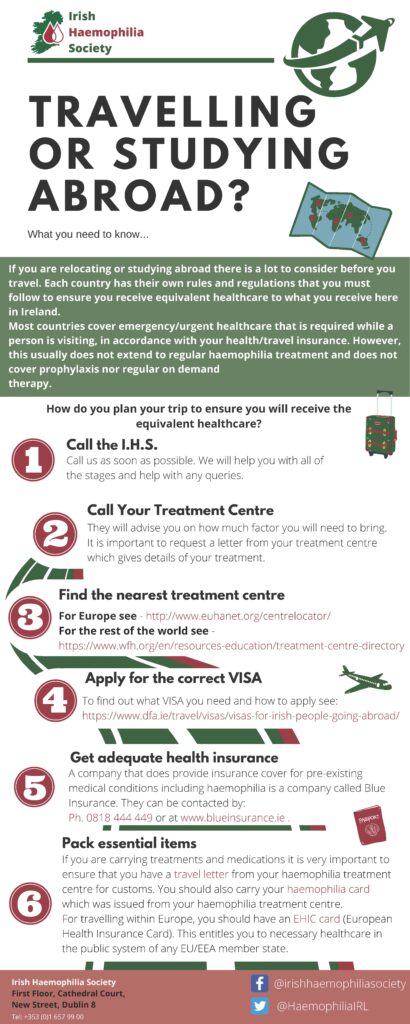Planning a Trip with Haemophilia
Traveling with haemophilia is possible with the right preparation and resources. This guide provides essential tools and tips for short holidays, longer stays, or even relocations to help make your journey safe, enjoyable, and well-planned.
Essential Pre-Travel Planning
A. Document Checklist
- Identification & Medical Documentation: Bring your passport, visas, travel insurance documentation, EHIC card (for EU travel), and the Irish Haemophilia Society Travel Card.
- Digital Backups: Store digital copies of all essential documents in a secure online drive to ensure you can access them anytime.
- Medical Records & Prescriptions: Include diagnosis details, treatment history, and doctor’s contact information.
B. Medical Planning
- Consultation: Meet with your haematologist to develop a travel-specific treatment plan, tailored for your destination and planned activities.
- Travel Letter for Customs: A letter detailing your condition, treatment needs, and supplies is helpful. Consider translating it if you’re visiting a non-English-speaking country. View this Sample Travel Letter.
- Medication & Supplies: Bring enough clotting factor, needles, and other treatment essentials for the entire trip, plus extra in case of delays.
C. Health Insurance Essentials
- Comprehensive Coverage: Verify that your travel insurance covers hemophilia and pre-existing conditions, including both emergency and routine care. Obtain written confirmation of coverage.
- European Health Insurance Card (EHIC): This card provides access to necessary healthcare within the EU. However, it doesn’t cover routine or private treatments, so additional insurance is recommended.
- Understanding Exclusions & Claim Process: Check policy exclusions (e.g., high-risk activities) and understand the process for making claims.
Planning for Specific Travel Types
Short-Term Travel (1-3 Weeks)
- Preparation Level: For shorter trips, plan to carry necessary treatment supplies, emergency contact information, and details of nearby hemophilia treatment centers (HTCs).
- EHIC Benefits (for EU): Ensure your EHIC is up-to-date for accessing emergency care, if required.
Long-Term Travel (3 Months to 4 Years)
- Support Network: Contact the Irish Haemophilia Society for advice on managing long-term travel needs, including guidance on connecting with local HTCs.
- Establishing Treatment Abroad: Arrange treatment with a local HTC, and schedule regular follow-ups. Research both emergency and routine treatment options well in advance.
Destination-Specific Guidelines
Europe (EU Countries)
- Using the EHIC: The EHIC provides access to necessary state healthcare during short stays.
- Local Healthcare Registration: For long stays, register with local healthcare services for easier access. Consider supplementary private insurance to cover non-emergency treatments.
United States
- High Healthcare Costs: The USA’s healthcare system is costly, and robust private insurance is essential for coverage.
- Policy Specifics: Ensure your insurance covers hemophilia-related treatments, and review policy details on pre-existing conditions and emergency coverage.
Australia
- Reciprocal Healthcare Agreement: Provides emergency care for Irish travelers but doesn’t cover haemophilia treatment.
- Longer Stays: Bring a doctor’s letter, and ensure private insurance is in place for stays over 3 months.
Canada
- Short Visits: For stays under 3 months, private insurance is mandatory.
- Extended Stays: Apply for provincial healthcare, though there may be a waiting period. Connect with Canadian HTCs before travel.
United Kingdom (Post-Brexit)
- Register with NHS & GP: Sign up with the NHS and find a local GP for haemophilia treatment coverage. Confirm the types of treatments available.
Special Considerations for Cruises
- Pre-Cruise Notification: Inform the cruise line of your condition to discuss any onboard medical capabilities.
- Familiarise with Onboard Facilities: Visit the ship’s medical center and understand their capabilities.
- Evacuation Plan: Know the ship’s nearest port locations and the evacuation procedures.
Traveling to Less Developed Countries
- Limited Treatment Access: Haemophilia resources may be limited, so pack extra supplies.
- Emergency Strategy: Identify the nearest HTC, even if it’s in a different country. Have a plan for urgent medical access.
- Local Support: Contact the Irish Haemophilia Society for guidance and support before embarking on travel.
Packing & Preparation Tips
- Treatment Supplies: Bring more clotting factor and supplies than you think you’ll need to cover potential travel delays or emergencies.
- Insulated Storage Solutions: Pack coolers or insulated bags for temperature-sensitive medications.
- Emergency Documentation: Carry printed copies of treatment records, prescriptions, and emergency contacts for easy reference.
Emergency Procedures While Abroad
- Contact Local HTC: In emergencies, reach out to the nearest HTC for immediate guidance.
- Insurance Notification: Contact your insurance provider about the situation to ensure coverage.
- IHS Support Line: The Irish Haemophilia Society is available for advice and support in emergencies.
Additional Resources & Support
World Federation of Hemophilia (WFH) Finder
A global directory of HTCs, accessible via the WFH, that helps you find treatment centers at your destination.
The Global Treatment Centre Directory
Find an National Member Organisation
EUHASS Centers
A network of certified treatment centers across Europe for hemophilia and bleeding disorders.
EUHANET Certified Centres
Department of Foreign Affairs (DFA) Travel Info
Stay informed of travel advisories, health alerts, and emergency support available through dfa.ie.
Irish Haemophilia Society Contact
For personalised travel support or queries:
- Phone: 01 657 9900
- Email: robert@haemophilia.ie
- Website: https://haemophilia.ie

